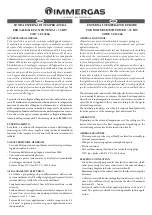
Installation & Operation Manual
4
Sidewall direct venting
FORCED AIR
INLET
VENT / AIR
TERMINATION
7' MIN. ABOVE ANY
PUBLIC WALKWAY
IF LESS
THAN 10’
36"
MIN.
Figure 4-4A Clearance to Forced Air Inlets
IF LESS
THAN 10’
36”
MIN.
FORCED AIR
INLET
BIRD
SCREEN
(TYPICAL)
7’ MIN. ABOVE ANY
PUBLIC WALKWAY
Figure 4-4B Alternate Clearance to Forced Air Inlets w/
Field Supplied Fittings
VENT PIPING
GALVANIZED
THIMBLE
VENT CAP
AIR PIPING
WALL PLATE
VENT PLATE
VENT
AIR
CENTERLINE WIDTH
Figure 4-5A Sidewall Termination Assembly
2. For Polypropylene Only: Install the vent and air intake
sidewall adapters from Table 3F on page 20 into the vent
plate. Slide the sidewall retaining bracket down the
sidewall adapters flush to the vent plate (FIG. 4-4B).
3. For PVC/CPVC Only: Install the vent and air intake
piping through the wall into the vent plate openings.
Use RTV silicone sealant to seal the air pipe. Use the
cement/primer listed in Table 3D on page 19 to seal the
vent
pipe.
4. Mount and secure the vent plate to the wall using stainless
steel screws. Seal around the plate to the wall assuring no
air
gaps.
5. Seal all gaps between the pipes and wall. Seal around the
plate to the wall assuring no air gaps.
6. Assemble the vent cap to the vent plate (see FIG. 4-5A).
Insert the stainless steel screws into the vent cap screw hole
openings and securely attach the vent cap to the vent plate.
7. Seal all wall cavities.
8. PVC/CPVC terminations are designed to accommodate any
wall thickness of standard constructions per the directions
found in this manual.
9. Stainless steel terminations are designed to penetrate walls
with a thickness up to 9.25 inches of standard construction.
26
Model
Air
Vent Centerline
Width
151 - 200
3"
3"
5 5/8"
286 - 601
4"
4"
5 5/8"
701 - 801
4"
6"
7 3/4"
Table 4B Sidewall Vent Centerline Dimensions
Prepare wall penetrations
1. Use the factory supplied wall plate as a template to locate
the vent and air intake holes and mounting holes.
Air pipe penetration:
a. Cut a hole for the air pipe. Size the air pipe hole as
close as desired to the air pipe outside
diameter.
Vent pipe penetration:
a.
Cut a hole for the vent pipe. For either combustible or
noncombustible construction, size the vent pipe hole
with at least a 1/2 inch clearance around the vent pipe
outer
diameter:
• 4½ inch hole for 3 inch vent pipe
• 5½ inch hole for 4 inch vent pipe
• 7½ inch hole (191 mm) hole for 6 inch (152 mm)
vent pipe
Drill 3/16” diameter holes for inserting the plastic anchors
into the wall.
















































